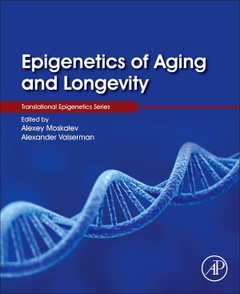Description
Epigenetics of Aging and Longevity
Translational Epigenetics vol 4
Translational Epigenetics Series
Coordinators: Moskalev Alexey, Vaiserman Alexander
Language: English
Keywords
Age acceleration; Aging; Aging-associated disease; Alzheimer's disease; Appetite regulation; Artificial intelligence; Atherosclerosis; Big data; Biological aging; Biomarker; Blockchain; Bone disease; Bone mineral density; Bone remodeling; Brain aging; Caloric restriction; Cardiovascular disease; Caste switching; Chromatin; Circulating ncRNA; Cognition; Cognitive function; CpG islands; Deep learning; Delta age; Developmental programming; Diabetes; Diet; Diomarker; Disease; DNA demethylation; DNA methylation; DNA methyltransferase inhibitors/activators; DNA repair; Double-strand break-induced small RNAs (diRNAs)Extracellular ncRNA; Drosophila melanogaster; Dyslipidemia; Early-life nutrition; Electronic health record; Energy balance; Epidemiology; Epidrugs; Epigenetic aging; Epigenetic clock; Epigenetic drugs; Epigenetic modification; Epigenetic variation; Epigenetics; Epigenomics; Gene expression; Genome integrity; Genome stability; Health; Healthy aging; Heterogeneity; Histone acetyltransferase activators/inhibitors; Histone deacetylase inhibitors; Histone demethylase inhibitors; Histone methyltransferase inhibitors; Histone modification; Histone modifications; Histones; Inflammation; iPOP; Life course; Lifestyle; Longevity; Metabolic syndrome; Methyl donor; Methylation; miRNA; Mortality; Muscle memory; Muscle stem cells; Myoblasts; ncRNA; Nonagenarians; Non-coding RNA; Noncoding RNAs; Nutritional programming; Obesity; Omics profiling; Osteoblast; Osteoclast; Pharmacoepigenetics; Physical exercise; Piwi-interacting RNA (piRNA)QDE-2-interacting small RNAs (qiRNAs)Senescence; Plasticity; Posttranslational histone modification; Precision medicine; Pregnancy; Programming; Psychosocial stress; Rapamycin; S-Adenosylmethionine; Satellite cells; Senescence; Single-cell methylomics; Sirtuin activators; Skeletal muscle; Small interfering RNAs (siRNAs)Social insects; Stress-resistance; Telomerase; Telomere maintenance; Telomere; Treatment
Support: Print on demand
Description
/li>Contents
/li>Readership
/li>Biography
/li>Comment
/li>
Epigenetics of Aging and Longevity provides an in-depth analysis of the epigenetic nature of aging and the role of epigenetic factors in mediating the link between early-life experiences and life-course health and aging. Chapters from leading international contributors explore the effect of adverse conditions in early-life that may result in disrupted epigenetic pathways, as well as the potential to correct these disrupted pathways via targeted therapeutic interventions. Intergenerational epigenetic inheritance, epigenetic drug discovery, and the role of epigenetic mechanisms in regulating specific age-associated illnesses?including cancer and cardiovascular, metabolic, and neurodegenerative diseases?are explored in detail.
This book will help researchers in genomic medicine, epigenetics, and biogerontology better understand the epigenetic determinants of aging and longevity, and ultimately aid in developing therapeutics to extend the human life-span and treat age-related disease.
Section I: Epigenetic Mechanisms in Aging 1. Aging epigenetics: changes and challenges 2. Defective DNA methylation/demethylation processes define aging-dependent methylation patterns 3. S-adenosylmethionine Metabolism and Aging 4. The Epigenetic Clock and Ageing 5. The Epigenetic Regulation of Telomere Maintenance in Aging 6. Living Long and Ageing Well: Are Lifestyle factors the Epigenetic link in the Longevity Phenotype? 7. Epigenetic Biomarkers for Biological Age 8. The Role of Non-Coding RNAs in Genome Stability and Aging 9. Intra-tissue DNA methylation heterogeneity in aging
Section II. Early-life Epigenetic Programming of Aging Trajectories 10. Early Life Nutrition, Epigenetics and Altered Energy Balance Later in Life 11. Early Nutrition, Epigenetics and Human Health 12. Biological Embedding of Psychosocial Stress over the Life Course 13. Epigenetics of longevity in social insects
Section III. Epigenetics of Aging-Associated Diseases 14. Drosophila melanogaster as a Model for Studying the Epigenetic Basis of Aging 15. Histone modification changes during aging: Cause or Consequence? - What we have learned about epigenetic regulation of aging from model organisms 16. Epigenetics of brain/cognitive aging 17. The role of epigenetic modifications in cardiometabolic diseases 18. Epigenetic mechanisms in osteoporosis 19. Epigenetics of Skeletal Muscle Aging
Section IV. Epigenome-targeted Therapies in Gerocscience 20. Healthy Aging and Epigenetic Drugs for Diabetes and Obesity: A Novel Perspective 21. Epigenetic Drugs for Cancer and Precision Medicine 22. Epigenetic Drug Discovery for Alzheimer’s Disease
Section V. Conclusions and Perspectives 23. Epigenetics of aging and longevity: challenges and future directions
researchers, clinicians and graduate students in genomic medicine, epigenetics, and biogerontology interested in the genetics of aging and treating age-related diseases
Dr. Vaiserman is head of the Laboratory of Epigenetics at the Institute of Gerontology, where his research has focused on long-term health consequences of adverse conditions in early life, genetic and epigenetic mechanisms of age-associated diseases, telomere length in patients with age-related chronic diseases, and molecular mechanisms mediating lifespan in Drosophila. He earned his PhD from the Institute of Gerontology, Kiev, Ukraine in 2004. During the last 7 years, Dr. Vaiserman was Project Leader for several Ukrainian government sponsored research projects. Dr. Vaiserman is also a member of the editorial boards of the journals Biogerontology, F
- Offers a comprehensive overview of the epigenetic nature of aging, as well as the impact of epigenetic factors on longevity and regulating age-related disease
- Provides readers with clinical and epidemiological evidence for the role of epigenetic mechanisms in mediating the link between early-life experiences, life-course health and aging trajectory
- Applies current knowledge of epigenetic regulatory pathways towards developing therapeutic interventions for age-related diseases and extending the human lifespan
These books may interest you

Epigenetics in Human Disease 170.55 €

Epigenetics and Reproductive Health 170.55 €

Epigenetics and Psychiatric Disease 135.60 €

